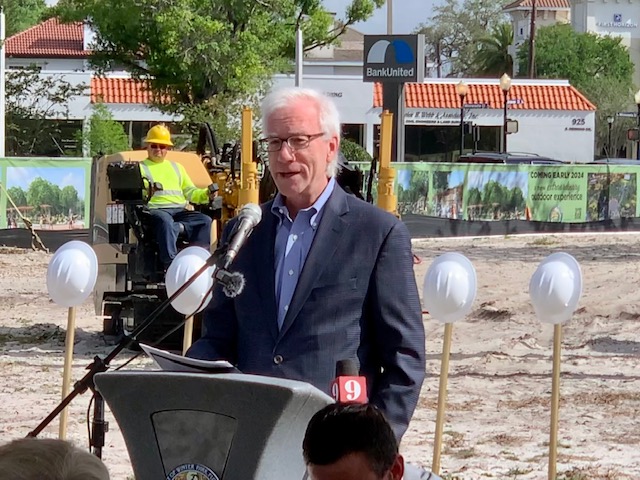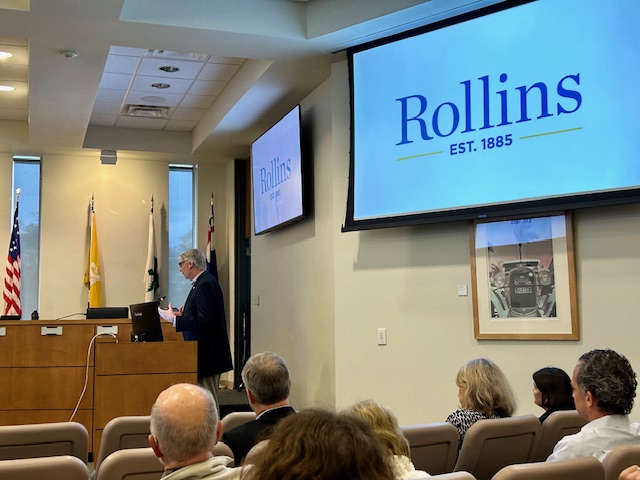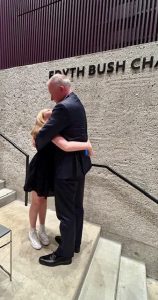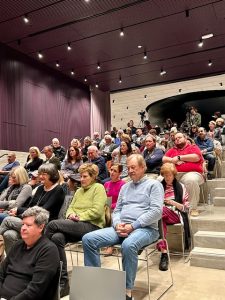
by Beth Kassab | Feb 1, 2024 | City Commission, News, Uncategorized
Commissioners don't budge on gas-powered leaf blower ban
The debate over how to keep leaves off lawns provoked angry outbursts
Feb. 1, 2024
By Beth Kassab
A proposal by Mayor Phil Anderson to delay the start of a ban on gas-powered leaf blowers by six months failed to gain traction Thursday morning as commissioners held a special meeting to discuss the change that is rivaling brick streets, the new library and multi-story buildings for controversy in Winter Park.
Instead, the board voted 3-2 to keep the July 1 start date, but delay imposing any fines until Jan. 1, 2025. Commissioners Kris Cruzada and Todd Weaver voted against the fine delay. Cruzada said his main concern was specifying regulations related to noise from the machines. Weaver argued that the 30-month delay in enforcing the ordinance since it was passed in 2022 was enough time for residents and landscape companies to comply.
The outcome is essentially the status quo because commissioners already acknowledged at a meeting last month that fines and aggressive enforcement weren’t the intent of the ordinance. City Manager Randy Knight said he did not expect code enforcement staff to actively patrol for violations, but rather respond to questions and reports of problems.
The debate surrounding how residents or their hired services should remove fallen leaves from their lawns grew louder in recent weeks since the commission approved a $50 utility bill rebate for residents who purchased electric versions of the devices.
Representatives from landscape companies have said they didn’t know about the new rule and told Anderson and City Manager Randy Knight in a meeting last week at City Hall that the cost of the electric blowers would crush their businesses.
Thursday’s meeting turned loud at times with Anderson twice pausing the meting to call on the audience twice to follow basic decorum. A dozen people spoke against the ordinance during public comment, including owners of landscape companies.
“We’re a small business and operate with historically small margins,” said Eric Kobb, the owner of one company, who estimated it would cost him about $100,000 to transition his crews to electric blowers and another $50,000 or more in additional yearly costs. “Where does this money come from?”
Chad Carter, another owner of a landscaping service, said his crews require about 20 blowers. He estimated the cost of each one would go up from about $500 to $2,000.
“How am I going to pay for that?” he asked. “The customer is going to have to pay for it.”
Another speaker criticized the commission for the ban, calling it “fascist,” and attempted to discredit the commission by pointing out that Winter Park’s electricity utility purchases its power from fossil fuel sources. Commissioner Todd Weaver attempted to point out that the commission recently passed a long-term plan to move to at least 80 percent renewable energy sources.
Yet another person even likened the policy to “Hitler.”
Anderson said the idea behind the 30-month pause after the ordinance was first passed in 2022 was to give companies time to naturally upgrade their equipment under the premise that the gas-powered machines would need to be replaced every two years or so.
“We naively felt the market would work,” he said.
Weaver defended the ordinance as an improvement for environmental and public health.
“For me, this is about exceptional quality of life,” he said. “We could have done something more harsh like implement it sooner … we could have done what California does and ban all gas-powered tools.”
He said there is misinformation circulating about how the devices must be charged, which he said can be done in workers’ vehicles. He also noted the batteries are recyclable.
Anderson, who will leave office by April after the March 19 election because he is not running for another term, asked for the city to call a check-in meeting or work session with landscape companies and others in April.
Because the commission did not decide to alter the original ordinance, the issue will no longer appear on the city’s next regular meeting on Feb. 14.
WinterParkVoiceEditor@gmail.com
To comment or read comments from others, click here →

by Beth Kassab | Jan 30, 2024 | City Commission, News, Uncategorized
Special commission meeting called on gas-powered leaf blower ban
The City Commission will meet on Thursday to discuss next steps
Jan. 30, 2024
By Beth Kassab
Mayor Phil Anderson has called a special meeting of the City Commission for Thursday at 9 a.m. to discuss how to handle a growing number of concerns about the ban on gas-powered leaf blowers that is set to take effect July 1.
The Commission passed the ordinance in 2022, but approved a 30-month delay in enforcement to give residents and landscape companies time to prepare.
But in recent weeks, landscape companies have said they did not know about the upcoming ban and expect the cost and other impacts of battery-powered equipment to be overly burdensome.
Anderson said a meeting he had last week at City Hall with representatives from landscape companies, equipment manufacturers and one company that is already using all-electric equipment was insightful.
“That meeting was really productive with some ideas shared,” he said. “So Thursday’s meeting is to sort of process that meeting and decide what we might want to do.”
He said he still expects the issue to be discussed at the next regular commission meeting on Feb. 14.
The ban was passed as an ordinance and any changes to it such as a delay in the start date or a full repeal would require specific public notice and two votes at two meetings.
Thursday’s meeting will allow the commissioners to have an open discussion to decide what changes, if any, they want to make.
Earlier this month, commissioners passed a $50 rebate in the form of a utility bill credit for residents who purchase electric leaf blowers.
But that does little to help the companies that serve thousands of lawns in Winter Park and use industrial level blowers that can cost $1,300.
In addition to concerns over the cost of the new equipment, landscapers have said the battery powered devices will slow down their work because they are less powerful, require charging and are heavier on workers’ backs.
“To comply with this law, more equipment on the trailer means more fuel costs to haul that equipment,” read one flyer that asks people to join in opposition to the ban. “This will result in higher costs to the homeowners and the landscaping companies purchasing and running generators to charge the blowers’ batteries.”
In Florida, Naples and Miami Beach have also approved bans. The Washington Post reported recently that cities across the country have put similar bans on gas leaf blowers into place such as Washington, D.C, and Evanston, Ill. California is set to begin enforcing a statewide ban on the sale of new gas-powered lawn equipment. Naples also enacted a ban.
Electric equipment is healthier for humans and the environment because there are fewer toxic emissions and comes without the jarring buzzsaw-like grind of a gas engine.
To comment or read comments from others, click here →

by Beth Kassab | Jan 26, 2024 | City Commission, News
Opposition builds against gas leaf blower ban
Landscape companies met at City Hall and now the ban scheduled to take effect on July 1 will be up for discussion at the next City Commission meeting
Jan. 26, 2024
By Beth Kassab
Representatives from landscape companies met Thursday with Mayor Phil Anderson and City Manager Randy Knight in an effort to blunt what they say will be a financial hardship brought by a ban on gas-powered leaf blowers set to be enforced starting this summer.
A city spokeswoman said a discussion on the topic will be scheduled for the next City Commission meeting on Feb. 14.
The ban, which is aimed at reducing noise from the machines as well as emissions that are harmful to the environment, was passed in 2022, though the City Commission opted to delay enforcement until July 1 of this year to give residents and companies time to transition to electric and battery-powered equipment.
But people representing the landscaping companies said few in the industry knew about the upcoming change until recently and have not prepared.
Earlier this month, commissioners passed a $50 rebate in the form of a utility bill credit for residents who purchase electric leaf blowers.
But that does little to help the companies that serve thousands of lawns in Winter Park and use industrial level blowers that can cost $1,300.
In addition to concerns over the cost of the new equipment, landscapers have said the battery powered devices will slow down their work because they are less powerful, require charging and are heavier on workers’ backs.
“To comply with this law, more equipment on the trailer means more fuel costs to haul that equipment,” read one flyer that asks people to join in opposition to the ban. “This will result in higher costs to the homeowners and the landscaping companies purchasing and running generators to charge the blowers’ batteries.”
In Florida, Naples and Miami Beach have also approved bans. The Washington Post reported recently that cities across the country have put similar bans on gas leaf blowers into place such as Washington, D.C, and Evanston, Ill. California is set to begin enforcing a statewide ban on the sale of new gas-powered lawn equipment. Naples also enacted a ban.
Electric equipment is healthier for humans and the environment because there are fewer toxic emissions and comes without the jarring buzzsaw-like grind of a gas engine.
WinterParkVoiceEditor@gmail.com
To comment or read comments from others, click here →

by Beth Kassab | Jan 25, 2024 | City Commission, News, Uncategorized
Commissioners must detail net worth unless lawsuit blocks new rule
Winter Park commissioners will consider at the next meeting whether to join a lawsuit to try prevent the financial disclosure rules from taking effect
Jan. 25, 2024
By Beth Kassab
About 12 miles south of Winter Park in another affluent city centered on a different chain of lakes, four out of the seven elected commissioners in the city of Belle Isle have resigned over new and far more detailed financial disclosures required by the state.
The new law, which beginning this year requires elected city officials to detail their net worth including assets and liabilities valued at $1,000 or more by July, is sparking resignations across Florida and, now, a legal challenge.
While no elected officials have resigned in Winter Park, city commissioners are now mulling whether to join a lawsuit that City Attorney Kurt Ardaman said he expects to be filed in early February.
Mayor Phil Anderson said during the discussion at Wednesday’s meeting that the new requirements appear intrusive.
“Note that no one resigned so come July 1, there’s going to be stuff out there we wouldn’t have normally had to do,” Anderson said. “You care about your community, but you also care about your privacy. This seems to be a pretty big reach into your privacy.”
Form 6, which has been filed by the governor, lawmakers, school boards and other constitutional officers for many years, is a new requirement for city officials as a result of changes by the Florida Legislature last year. Until now, city officials filed a far less detailed disclosure known as Form 1, which asked for sources of income, property and liabilities, but did not require any dollar amounts.
The forms are then added to a Florida Commission on Ethics database searchable by the public.
Commissioner Todd Weaver expressed concerns over potential theft over having to list expensive items in his home.
“I just feel like its an open invitation for theft,” he said. “I think its egregious.”
But the form allows officials to report household items as an aggregate figure without a detailed list. The detail required is related to financial assets, property, business interests and any debts. Liabilities are then subtracted from an official’s total assets to determine net worth.
While a number of elected officials have called the change an overreach, the ethics commission uses them as a way to provide the public with accountability when it comes to understanding any conflicts of interest an elected official might have. The forms could also serve as a check on whether officials appear to be privately profiting from holding public office.
Ardaman said the city would pay a $10,000 flat fee to join the lawsuit. He said multiple cities he represents are considering whether to join.
The Orlando Sentinel reported that in surveyed local governments in Lake, Orange, Osceola and Seminole Counties, and found that eight elected officials have resigned. They include two in Edgewood, one in Casselberry, and one Windermere, in addition to the four in Belle Isle.
Commissioners set another discussion on the topic for Feb. 14.
WinterParkVoiceEditor@gmail.com
To comment or read comments from others, click here →

by Beth Kassab | Jan 25, 2024 | City Commission, News, Uncategorized, Zoning and Development
Commission postpones decision on Rollins faculty apartments
The liberal arts college offered a concession right out of the gate by reducing the number of units from 48 to 39, but commissioners wanted more
Jan. 25, 2024
By Beth Kassab
The City Commission on Wednesday postponed a decision on a request from Rollins College to build faculty apartments a few blocks north of Fairbanks Avenue from the liberal arts campus despite a significant reduction in units and new project renderings.
Rollins President Grant Cornwell immediately acknowledged nearby residents’ discontent over the proposal and offered to reduce the number of units from 48 to 39.
“We’ve heard the concerns about parking and we’ve heard concerns about density so we come here to you today prepared to build a smaller project than we originally proposed,” he said, explaining that he sees faculty apartments as “strategic” to the college’s mission and “nobody is making any money here … this isn’t a business deal.”
But that did little to quell concerns and several commissioners presented lists of additional demands and questions from the length of time Rollins must maintain the project as faculty and staff housing, to what defines faculty, the materials used to construct the building, potential mandatory solar power to the building’s aesthetics.
The number of stories and whether the roof is sloped or flat emerged as perhaps the biggest sticking point of the night. Typically buildings along that stretch of Welbourne Avenue are restricted to 2.5 stories with a sloped roof and dormer windows. But Rollins is asking for three story vertical construction with a flat roof, which is allowed just blocks away in the city’s Central Business District.
Becky Wilson, an attorney from Lowndes who represents Rollins, explained that the dormer windows would not work because the third level needs to be used for full units and sloped walls would interfere in the design.
“We also worked a little on the renderings,” she said, nodding to concerns expressed by residents at last week’s Planning & Zoning Board meeting about the architecture.
She emphasized that Rollins will continue to own and control the building and would prohibit tenants from draping items over the balconies or making them unsightly in other ways.
Some of the residents’ concerns conjured images of a fraternity house versus up to three-bedroom units for new professors and their families. A number of residents of the Douglas Grand condominium building said they feared their own units will drop in value because of Rollins’ planned framed construction with what they called too few architectural details to emulate the Spanish-Mediterranean style the main campus is known for.
“Please consider whether or not you would purchase a $1 million residence across the street from what would be at best an average maintained, subsidized apartment complex,” read one email to commissioners from a resident.
“It is the appearance of the rental facility that makes it even more distasteful,” read another.
“Not to sound snotty, but this is the type of apartment better suited for cities like Fern Park or Casselberry,” a resident wrote.
Wilson clarified that the apartments would not be restricted by income, but the college plans to charge rents based on affordability for people who earn up to 120%, or perhaps even more, of the area median income.
Cornwell has said he envisions tenure-seeking faculty who are early in their careers to utilize the units so they can afford to live near campus, where many home prices easily exceed $1 million.
As the meeting went on, it became clear there weren’t enough votes for Rollins to win approval, particularly after Mayor Phil Anderson said he wasn’t comfortable with a three-story building and other factors.
“For me, compatibility is less about intensity and more about what the building is going to look like,” he said.
Anderson urged residents to understand that whether the college pays property taxes on the property or not is up to federal and state rules governing tax-exempt organizations and a determination by the county property appraiser. Typically, non-profit groups — even big-monied ones like hospital systems AdventHealth and Orlando Health and major universities — don’t pay property taxes when the land is used to further the group’s mission.
City Attorney Kurt Ardaman said there is case law to support faculty housing as a purpose that would qualify for an exemption.
The City Commission voted unanimously to table a decision until its next meeting on Feb. 14.
WinterParkVoiceEditor@gmail.com
To comment or read comments from others, click here →

by Beth Kassab | Jan 23, 2024 | City Commission, Election, Library, News, Uncategorized, Zoning and Development
Two commission candidates offer views on growth, old library, Rollins apartments and more
Monday’s forum at the Winter Park Library was the first of the election season
Jan. 22, 2024
By Beth Kassab
Commission Seat 2 candidates Jason Johnson and Craig Russell faced off at a forum Monday night at the Winter Park Library, revealing some clear, if subtle, differences in their philosophies on questions such as what to do with the old library building, a proposal for Rollins College faculty apartments and the future of development in Winter Park. (Watch a recording of the event here.)
Stockton Reeves, the third candidate in the race, did not attend the forum. Carol Foglesong, the moderator from the Orange County League of Women Voters, announced Reeves was “caught out of town on his job and was not able get back … so it’s not that he didn’t show it’s that the job got in the way for tonight.”

Jason Johnson shares a hug with his daughter after the forum.
That raised some confusion, however, because Reeves met in person on Monday with Winter Park residents involved in the Fix 426 effort at an Orlando office. He did not immediately respond to a question from the Voice about whether he was out of town during the forum, though he previously told the Voice he had a work conflict during the event that he was trying to reschedule.
Russell and Johnson, both first-time candidates for public office, showcased their knowledge and experience in the local community.
Both credited their children and families as their biggest accomplishments and appeared to agree on issues like examining how the city’s Community Redevelopment Agency, a special downtown tax increment district that the current City Commission is trying to expand, could play a role in providing more affordable housing.
They also agreed that recent increases in pay for police officers have made the department more competitive in hiring.
Neither expressed a firm opinion when asked whether Winter Park should let voters decide whether to adopt single-member districts or carving the city into sections that each elect a representative to the City Commission. Russell, who is Black, nodded to the merits of diversity several times during the forum. Winter Park has not elected a Black commissioner in more than 130 years.
“There isn’t enough data for me to answer,” said Russell, a teacher and coach at Winter Park High who also serves on the city’s Parks and Recreation Advisory Board and as a trustee for the Winter Park Library. “If there’s true representation that kind of solves that problem.”

Craig Russell poses with students who came out to support him at the candidate forum.
Johnson, an attorney and current chairman of the city’s Board of Adjustments, said he’s “always in favor of allowing voters to decide” and noted single-member districts have positives and negatives and he would want more information.
While both candidates largely described their future vision of Winter Park as keeping the look and feel of the city much the way it is today, some differences emerged.
On the Rollins College proposal for 48 new apartments aimed at providing attainable housing for faculty closer to campus, Russell signaled a willingness to find a way to make it happen.
“How do we make it work?” Russell asked of the project on New England Avenue that has drawn complaints from neighbors about its density, architecture and potential shortage of parking. “I don’t think the immediate answer is no … Rollins historically has been a good neighbor to us and it’s an opportunity for something we haven’t done here in Winter Park and I’m very open to hear more about it.”
Johnson said he didn’t want to express a firm viewpoint, but seemed more skeptical.
“I do think there is a need for housing for faculty and staff in the city, so I understand why Rollins wants to do it,” he said. “But I also understand some of the residential concerns.”
On the matter of the old library building, which continues to pose a conundrum for city officials since the City Commission recently rejected a second round of proposals that came in to redevelop the parcel, Johnson said he opposed selling the land. A sale has been brought up multiple times to raise revenue for other projects.

A packed crowd listens to candidates for Commission Seat 2 at the Winter Park Library.
He said a sale is on the “bottom of my list of priorities,” because “it’s a gateway and it’s too valuable of an asset to sell off for a few dollars today. I wouldn’t’ support that right now.”
Later in the forum, Johnson brought up one idea that’s been discussed, which is to turn the land into a small park space.
Russell said he would “have to lean on a bunch of contacts that I have to learn more about that situation” and expressed concern about the building falling into disrepair.
When it comes to a general growth philosophy, Johnson appeared to express a bit more skepticism there, too.
“I think there’s a certain segment that would have you believe we need greater balance between residential and commercial tax bases,” he said. “I don’t know that I share that belief. I want to protect our neighborhoods from commercial encroachment, but I do think there are ways we can improve both the neighborhoods and the commercial vitality. We need to make sure our infrastructure is better improved and maintained.”
Russell said he wanted to talk to experts about the possibility of growth.
“We have to be able to open to listen to the possibility of growth,” he said. “We have to be open to listen to the experts who can tell us how can we solve this problem. I don’t know all the answers. I know where we can find the answers … I know there are generations that want to come back here and I’m open to listen to all ideas.”
WinterParkVoiceEditor@gmail.com
To comment or read comments from others, click here →









Recent Comments